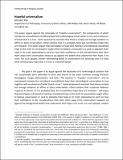Hopeful universalism
Abstract
This article argues against the rationality of ‘hopeful universalism’, the components of which include the unconditional considered hope that soteriological universalism is true, and an absence of belief that it is true. Some proponents maintain that there is simply not enough evidence to affirm or deny universalism; others believe that it is probably false but nonetheless hope they are mistaken. This article argues that worshippers of God who maintain unconditional considered hope in the truth of universalism ought either to believe universalism or seek to abandon their hope in its truth, depending (in part) on how their confidence in the considerations that steer them away from universalism measure up against the beliefs that underwrite their hope in its truth. For such people, neither withholding belief in universalism nor believing that it is false while continuing to hope that it is true is a rational option.
Citation
Rea , M 2020 , ' Hopeful universalism ' , Religious Studies , vol. First View . https://doi.org/10.1017/S0034412520000402
Publication
Religious Studies
Status
Peer reviewed
ISSN
0034-4125Type
Journal article
Collections
Items in the St Andrews Research Repository are protected by copyright, with all rights reserved, unless otherwise indicated.

